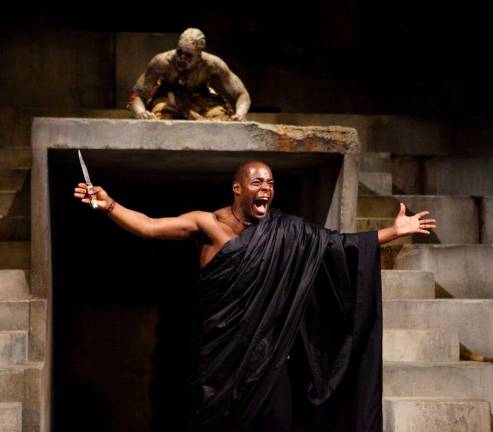African Caesar

New take on Shakespearean politics at BAM
By Valerie Gladstone
"Julius Caesar" doesn't usually get ranked as one of Shakespeare's most exciting plays but last year theatergoers in England were given reason to change their minds after seeing the Royal Shakespeare Company's revival, reset in modern Africa, with an all black cast. In its new incarnation, directed by Gregory Doran, the RSC's artistic director, the political drama, concerning the conspiracy against the Roman dictator, his assassination and the defeat of the conspirators in battle, unexpectedly took on surprising relevancy. Such dramatic events are not uncommon in politically volatile Africa today or in the North African countries that were part of the Arab Spring. It comes to the Brooklyn Academy of Music April 10-28.
Doran decided to move "Julius Caesar" from ancient Rome to modern-day Africa chiefly because he learned that it is the Shakespeare play most performed in Africa and that it is a particular favorite of Nelson Mandela's. When Mandela and other inmates were imprisoned in South Africa during the apartheid years, they read what became dubbed the Robben Island Bible, a copy of Shakespeare's complete works, which was smuggled into their jail. Now on display at the British Museum, it is signed with his name next to the lines from the play: "Cowards die many times before their deaths; The valiant never taste of death but once. Of all the wonders that I yet have heard. It seems to me most strange that men should fear; Seeing that death, a necessary end, Will come when it will come."
In recent calls to London, members of the cast talked about their new Shakespearean experience. "People find it hard to believe that we are speaking Shakespeare's lines and that none of the action has been changed," says Ray Fearon, who has the role of Caesar's ally and defender, Mark Antony. "The plot has taken on a very different feel; young people get it immediately." For some of them, long associated with the RSC and hailing from the UK, US, Nigeria, Ghana, Jamaica and Trinidad, the situation portrayed in the drama echoes those they or their families experienced at home. "I grew up in Nigeria during the Biafran War in the late '60s," says Cyril Nri, who plays Cassius. "I saw first hand what happens when there's a power grab that leaves a vacuum."
Adjoa Andoh, who plays Portia, remembers reading the play in school and finding it "dull as dish water but then, she says, "when I saw what happened in my father's country of Ghana, I suddenly looked at it differently. The characters talk of gods and ancestors, which seems quaint to us in the West but is truthful and current in Africa. African ceremonial dress is not unlike Roman togas. In such a male heavy production, I feel it's important to show Portia as a strong woman for whom politics is a part of her DNA. I'm now so keen on the play that I visit schools and encourage kids to read it."
To further the African atmosphere, Doran added a musical score by Akintayo Akinbode that mixes African music with touches of jazz and the Caribbean. "There's so much life in the drums and sax, flutes and bass," Nri says. "It not only affects the mood but gives a sense of the African landscape and the beauty and danger of Africa. The rhythms make certain moments incredibly passionate and moving. We always include a chorus from the community. In New York, the chorus will be local volunteers. The stage gets so full. It's a joy every night." In the Times of London, Libby Purves wrote that this production, "shakes the heart."